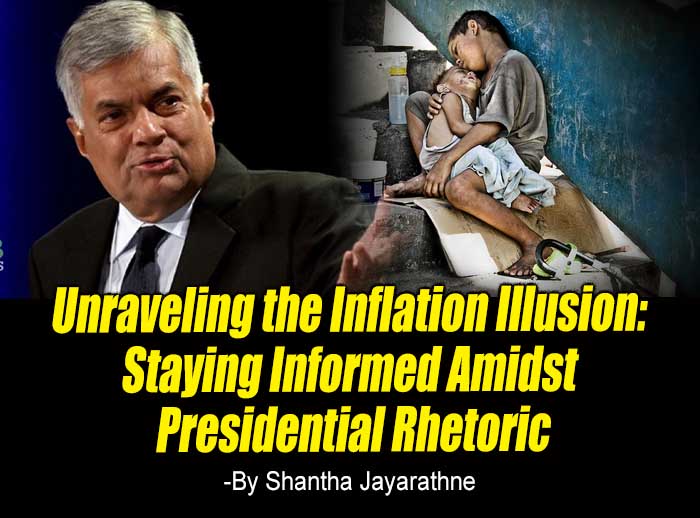-By Shantha Jayarathne

(Lanka-e-News - 02.Aug.2023, 11.00PM) As citizens of Sri Lanka, we find ourselves facing challenging economic times, with the recent economic contraction of -11.5% in the first quarter of 2023, according to recent Mid-Year Fiscal Report by the Ministry of Finance. The economic downturn has taken a toll on our daily lives, and amidst it all, there are claims of falling inflation rates to single digits, creating an illusion of economic stability. However, it is crucial not to be swayed by rhetoric alone and instead delve deeper into economic indicators to comprehend the reality behind the numbers. Despite these claims, the struggles persist, with an alarming rise in poverty, impacting 7 million people out of the total 22 million population, as per the latest World Bank report.
Inflation is a critical indicator of an economy's health, but it can be misleading when not scrutinized closely. A single-digit inflation rate may sound reassuring, but it is essential to examine the components contributing to this decline. Is the decrease driven by essential goods and services, which have a direct impact on our daily lives, or is it attributed primarily to non-essential items that may not significantly affect the average citizen's budget?
In addition to the economic challenges, Sri Lanka faces a massive brain drain that significantly affects crucial sectors such as healthcare, education, and the burgeoning IT industry. The departure of skilled doctors and professors has left hospitals and universities grappling with staff shortages, adversely impacting the quality and accessibility of essential services. Similarly, the IT industry struggles as talented minds seek opportunities abroad due to limited prospects and inadequate support at home. These losses are detrimental to our nation's progress and require urgent attention.
While official inflation statistics might suggest a manageable cost of living, the reality may be starkly different. The prices of essential goods such as housing, education, healthcare, and food might still be increasing at a pace that burdens the majority of Sri Lankans. Despite the claims of falling inflation, many citizens continue to struggle to make ends meet, leading to growing concerns over their overall well-being.
The widening gap between the rich and the poor continues to be a pressing issue in Sri Lanka, exacerbated by a lack of job opportunities for many. Even with a single-digit inflation rate, income inequality persists, leaving a significant portion of the population marginalized and struggling to cope with the rising costs of basic necessities. This disparity further deepens the challenges faced by the vulnerable sections of society, perpetuating the cycle of poverty.
Despite claims of economic growth, we must scrutinize the type of growth our nation is experiencing. Is this growth inclusive, benefiting all segments of society, or is it skewed towards a privileged few? The recent economic contraction of -11.5% in the first quarter of 2023 and the mounting debt burden of 83 billion USD raise concerns about the sustainability of such growth. It is vital to assess whether the economic progress is inclusive, creating opportunities for the majority to improve their living standards.
The escalating cost of medicine has become a pressing issue, with hospital drugstores facing severe shortages. The burden of healthcare expenses falls heavily on the average citizen, leading to financial strain and compromised access to essential treatments. The absence of affordable healthcare solutions has driven many talented medical professionals to seek better opportunities abroad, leaving the nation grappling with a healthcare crisis.
Amidst these challenging circumstances, it is crucial for citizens to be discerning and not be misled by political propaganda. Rhetoric and grand promises must be scrutinized against the harsh realities that Sri Lanka faces today. We must demand transparency, accountability, and sustainable policies from our leaders to address the deep-rooted issues that hinder our nation's progress.
Sri Lanka's economic woes and brain drain have resulted in a dire situation, with vital sectors like healthcare, education, and IT suffering immensely. The overwhelming income disparity, along with a mounting debt burden, paints a sobering picture of the challenges we face. President Ranil Wickremesinghe's promises of prosperity should not overshadow the pressing issues that demand immediate attention and concrete solutions. As responsible citizens, it is our duty to stay informed, challenge propaganda, and demand effective governance to build a more equitable and prosperous Sri Lanka for all.
Former Senior Consultant
Sri Lanka Institute of Development Administration
---------------------------
by (2023-08-02 19:35:45)
Leave a Reply